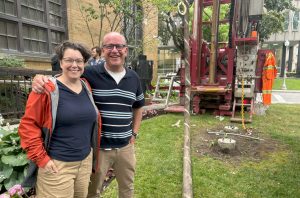MONTREAL – Outremont has moved a step closer to holding referendums on a controversial bylaw that would prohibit new places of worship on its main commercial arteries.
At an extraordinary meeting Feb. 29, the borough council voted in favour of opening two public registries at the end of March concerning the zones around Laurier and Bernard avenues.
The bylaw, which was passed on second reading by a majority of the four councillors in December, is being vigorously opposed by the chassidic community. With its growing numbers, the community says it must have more places of worship, and they have to be located near where its members live.
READ: TENSIONS HIGH AS OUTREMONT CONSIDERS HOUSES OF WORSHIP RESTRICTIONS
Chassidim have traditionally held religious services in former residential or commercial properties, and had made a request to open a new centre on Bernard before the bylaw was proposed last fall.
Some Chassidim have hired prominent civil rights lawyer Julius Grey, who sent the council a demand letter in December warning that if the bylaw comes into force, they will contest it in court.
Outremont wants to restrict new places of worship to a zone in the northeast section of the borough.
The intention of the ban is to revitalize commerce on Laurier and Bernard.
The council was expected to announce the week of March 7 who can sign the registries and the percentage needed to trigger a referendum.
If those requirements are met, the referendums may be held before the summer.
In January, the borough held a public consultation in which eligible residents or business owners in the three affected zones could record their interest in participating a referendum, the first step in the process according to provincial law.
Sufficient demands were received for the Bernard and Laurier areas, nine and seven, respectively, but the two from the zone bordered by Hutchison and Van Hornes avenues and the railway tracks were judged to be invalid. That is the zone where the borough is proposing to limit the establishment of new places of worship.
The sole councillor to vote against the bylaw and the holding of referendums is Mindy Pollak, a chassidic community member.
READ: CHASSIDIM VOW COURT ACTION IF OUTREMONT REZONING GOES AHEAD
Alex Werzberger, one of the complainants named in Grey’s demand letter, said the chassidic community will mobilize to get members to sign the registers.
However, they will do so not because they are eager for a referendum because otherwise “they will say those people don’t care. It’s just a few troublemakers.”
He points out that the council is not obliged to hold a referendum even if enough names are put on the registries.
“The council can still withdraw or shelve the bylaw,” he said.






